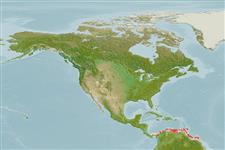Elasmobranchi (squali e razze) (sharks and rays) >
Rajiformes (Skates and rays) >
Rajidae (Skates)
Etymology: Breviraja: Latin, brevis = short, brief + Latin raja = ray (Raja sp.) (Ref. 45335); nigriventralis: From the latin 'nigr' meaning black and 'ventralis' pertaining to the belly (Ref. 31371).
Environment: milieu / climate zone / depth range / distribution range
Ecologia
marino batidemersale; distribuzione batimetrica 549 - 776 m (Ref. 31371). Deep-water; 13°N - 5°N, 81°W - 51°W (Ref. 114953)
Western Central Atlantic: Panama to French Guiana.
Size / Peso / Age
Maturity: Lm ? range ? - ? cm
Max length : 40.0 cm TL maschio/sesso non determinato; (Ref. 31371)
Oviparous (Ref. 50449). Eggs have horn-like projections on the shell (Ref. 205). Males reaches maturity at ca. 38-40 cm TL (Ref. 114953).
Life cycle and mating behavior
Maturità | Riproduzione | Deposizione | Uova | Fecundity | Larve
Oviparous, paired eggs are laid. Embryos feed solely on yolk (Ref. 50449). Eggs have horn-like projections on the shell (Ref. 205).
Last, P.R., S. Weigmann and L. Yang, 2016. Changes to the nomenclature of the skates (Chondrichthyes: Rajiformes). In: Last and Yearsley (eds.). Rays of the World: Supplementary Information. CSIRO Special Publication. 11-34. (Ref. 118749)
IUCN Red List Status (Ref. 130435: Version 2024-1)
Threat to humans
Harmless
Human uses
Strumenti
Special reports
Download XML
Fonti Internet
Estimates based on models
Preferred temperature (Ref.
123201): 5.7 - 6.8, mean 6 °C (based on 4 cells).
Phylogenetic diversity index (Ref.
82804): PD
50 = 0.5156 [Uniqueness, from 0.5 = low to 2.0 = high].
Bayesian length-weight: a=0.00302 (0.00141 - 0.00645), b=3.24 (3.07 - 3.41), in cm total length, based on LWR estimates for this (Sub)family-body shape (Ref.
93245).
Trophic level (Ref.
69278): 3.7 ±0.6 se; based on size and trophs of closest relatives
Resilienza (Ref.
120179): Basso, tempo minimo di raddoppiamento della popolazione 4.5 - 14 anni (Fec assumed to be <100).
Fishing Vulnerability (Ref.
59153): Low to moderate vulnerability (30 of 100).
